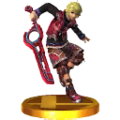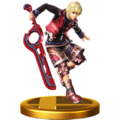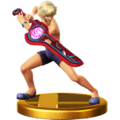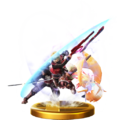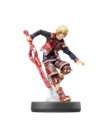Shulk (SSB4)
| Shulk in Super Smash Bros. 4 | |
|---|---|
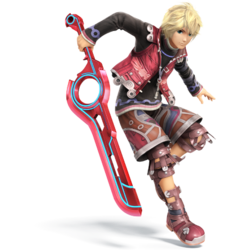 
| |
| Universe | Xenoblade Chronicles |
| Availability | Starter |
| Final Smash | Chain Attack |
| Tier | D (38) |
| “ | Shulk Foresees a Fight! | ” |
| —Introduction Tagline | ||
Shulk (シュルク, Shulk) is a playable character in Super Smash Bros. 4. Initially leaked alongside Bowser Jr. and Ganondorf via footage used by the ESRB, Shulk was officially confirmed on August 29th, 2014, the same day that Xenoblade Chronicles 3D, the New Nintendo 3DS port of his Wii debut title Xenoblade Chronicles, was announced. Additionally, he was the final character revealed prior to the release of Super Smash Bros. for Nintendo 3DS. Adam Howden and Shintarō Asanuma reprise their roles as Shulk's voice actors in the English and Japanese versions of SSB4, respectively.
Shulk is currently ranked 38th out of 58 on the SSB4 tier list, placing him in lower D tier and in the third lowest mid tier. Thanks to the Monado, he possesses the longest overall disjointed range of any character in the entire series. As a result, Shulk has one of the most effective movesets for spacing relative to the rest of the cast, which is most evident with his wide-ranged neutral and forward aerials, as well as long-ranged smash attacks that possess respectable overall damage outputs and KO potentials.
The Monado also grants Shulk wide versatility thanks to its Monado Arts, which allow him to adapt his attributes to fit the situation while opening up opportunities that he would not have without them. This includes outstanding recovery with Jump, one of the best approach speeds with Speed, very high survivability with Shield, a very high overall damage output with Buster, and some of the strongest finishing moves in the game with Smash. In addition to their general benefits, Jump grants potent edgeguarding and aerial combo potentials, while Speed and Buster grant grounded combo potential. He also has one of the most effective counterattacks in Vision, which boasts high range and power along with one of the longest counterattack windows of its kind.
However, Shulk is hindered by very sluggish frame data: almost none of his attacks come out within 5 frames (barring his neutral attack), and while his aerial attacks can be interrupted during their ending frames, all of his aerial attacks have extremely high ending lag and cannot autocancel in any way. This makes him highly prone to punishment and out of shield retaliation, and when combined with his tall stature, makes it difficult for him to avoid juggling.
Shulk also has a very high learning curve due to his Arts giving him new weaknesses, such as different mobility speeds and/or different knockback angles to consider. Additionally, the Monado Arts are also involved with his most advanced techniques, such as Monado Art Landing Lag Canceling (MALLC), all which involve the precise activation and cancellation of his Monado Arts.
Due to his demanding techniques, along with his sluggish attacks and inability to auto-cancel causing him to rely heavily on spacing, Shulk is a rarity in tournaments, with low representation and below-average results in high-level play. Despite this, Shulk's playerbase has gradually discovered set-ups and technical combos that are unique to him due to his Monado Arts, with their efforts resulting in him achieving more consistent placings at regional tournaments. Additionally, he has achieved several noteworthy results in national tournaments due to the work of dedicated mains such as Nicko and Darkwolf.
Attributes
Much like in his home game, Shulk is a character who revolves around adapting to different situations with his attribute-enhancing Monado Arts. In comparison to the extreme changes granted by his Arts, most of Shulk's characteristics are relatively balanced: his walking, falling speeds and gravity are all average, his dashing is slightly below average, his air speed is above average and his air acceleration is below average. Shulk is also a heavyweight, which by extension makes him the third heaviest sword-wielder in the game behind Ike and Link. Thanks to these attributes, Shulk has relatively good mobility for a character of his weight class, especially in the air, although they do not grant him too many obvious advantages or disadvantages.
Shulk's greatest strength is his disjointed range. The Monado's range grants him the single longest disjointed melee attacks in the series, even surpassing Ike and Cloud's, with most of his normal attacks having overall long ranges. Shulk's excellent range allows him to punish careless moves by retaliating at a distance, or create space by challenging his opponent with his disjointed attacks. His most useful grounded moves are his neutral attack, up tilt and smash attacks, each of which possess distinct perks. His neutral attack is the most damaging non-infinite neutral attack in the game, even without Buster. His up tilt boasts outstanding vertical range and can cover multiple get-up options from the edge. Lastly, his smash attacks boast high power and long ranges; his forward smash is particularly notable due to being the third longest ranged forward smash in the game, being surpassed only by Corrin and Mii Gunner's.
His range also applies to his aerial moves, and collectively grant him a powerful air game. Both his neutral and forward aerials possess wide-arced ranges with low landing lag, making them Shulk's best approach options. The former is useful for anything from starting combos to covering landing options due to its long-lasting hitbox and low landing lag, while the latter lasts shorter and has slightly more landing lag, but ends faster making it a very good edgeguarding and spacing option. His back aerial is a capable KOing option thanks to its great range and being his most powerful aerial. Lastly, his up and down aerials are, like his back aerial, thrusts rather than slashes. As such, they have minimal horizontal ranges, but can KO surprisingly early should they hit, with the former being potent near the upper blast line and the latter being capable of meteor smashing.
Shulk's defining abilities are his Monado Arts. Each Art tweaks his attributes considerably for 16 seconds and can be manually canceled at any time, even during hitstun. With this freedom, Shulk can activate an Art to open up options for virtually any situation while still being able to switch or cancel them if he is in a bad position. Jump grants him significant aerial mobility by making his jumps the highest in the game while improving both his air speed and Air Slash's height. This allows him to recover from almost anywhere off-stage, edgeguard more aggressively and even perform several KO combos, such as a wall of pain leading to a sacrificial Air Slash at moderate percentages or a buffer canceled up throw to up aerial at high percentages. Speed amplifies his usually average ground speed while reducing his jump height, making his short hopped aerials more efficient for combos and spacing, while allowing him to approach and retreat noncommittally. It also lowers traction, making Shulk's pivot grab the third longest in the game (tied with Meta Knight) for its duration. These two Arts grant him outstanding mobility for a heavyweight, and when combined with the large hitboxes of his attacks, Shulk can effectively space opponents out of a specific side of the stage with either Jump or Speed, making him very difficult to approach on stages with platforms.
Shield bolsters Shulk's defensive game by reducing both damage and knockback taken, which allows him to survive for a much longer period of time and resist getting trapped in combos. His shield also becomes more durable, making it harder to break with shield-breaking attacks such as Bowser Bomb. Buster reduces his overall knockback, but increases his overall damage output, allowing him to rack up damage extremely quickly. Buster also makes up and down throws into potent combo starters at 0%, while the increased damage and shieldstun make Shulk's moves both safer on shield and capable of pressuring shields. Lastly, Smash boosts his entire moveset's knockback, making almost all of Shulk's attacks KOing options (especially with rage), and his down throw becomes the strongest in the game while it is active. With access to these attribute-changing abilities, Shulk is highly adaptive, and usually has an easier time mixing up his playstyle compared to other characters so long as his Arts are used effectively and in tandem with his powerful air game.
Due to his Monado Arts, Shulk also has access to a unique advanced technique known as Monado Art Landing Lag Canceling. By jumping and timing the activation of an Art just before landing, Shulk can reduce the landing lag of his aerials to 5 frames while gaining intangibility for 14 frames (1 frame less than the length granted by his sidestep). While difficult to perform, it allows Shulk to avoid a punish before immediately responding with a punish of his own, or start shield break combos, such as an Art canceled back aerial to forward smash. It can even let him retreat by pivoting in midair. This technique is the only viable way to make some of Shulk's moves (such as back aerial) safe on shield against faster characters, and if mastered, can be a very effective and unpredictable mix-up option inaccessible to any other character in the game.
Excluding his Arts, Shulk's special moveset shares his overall high range, and all have their own forms of utility. Back Slash is very powerful when striking the opponent's back and has long range regardless, making it a great surprise attack as well as a decent spacing tool. Air Slash grants a good amount of vertical distance, comes out quickly, and has strong knockback growth, making it a good recovery move and an even better out of shield option. The distance and knockback of Air Slash can additionally be affected by the Jump and Smash Arts respectively, allowing the move to gain even more vertical distance, or be used as a combo finisher in the air or a KO option out-of-shield. Lastly, Vision is tied with Double Team for having the longest lasting counterattack window in the game when fresh while also having the longest range, both of which give Shulk one of the most effective counters of any character. Its alternate counterattack, which is performed when Shulk inputs the direction from which the triggered attack came from, also rivals Corrin's Counter Surge as the strongest counterattack in the game.
However, Shulk has some glaring and exploitable weaknesses. Despite his outstanding range, his moveset is infamously sluggish to compensate, being among the slowest in the game along with King Dedede and Ganondorf's movesets. Barring his neutral attack, standing grab and Vision, none of his attacks come out before frame 9, while only his down tilt has less than 25 frames of ending lag. Like the aforementioned heavyweights, this means he has to rely on careful reads to land a hit, as a missed attack can easily be capitalized upon by his opponent. This is made worse by the low shieldstun of his attacks (unless Buster is active), making his attacks inherently unsafe up close (and especially on shield), while still unsafe if spaced against faster characters prevalent in the metagame. Additionally, most of Shulk's moves deal more damage with the Monado's blade rather than its beam blade, while several of his strongest combos (such as a landing neutral aerial to a grab or a forward aerial wall of pain) rely on him being extremely close to his opponent to be inescapable. As a result, Shulk is somewhat reliant on being at a punishable distance to start dealing any significant damage.
His sluggish frame data also extends to his aerials. While he is uniquely the only character who can interrupt the ending lag of his aerials with a jump, air dodge or another air attack, all of Shulk's aerials have disproportionately high ending lag, with neutral aerial in particular having 71 frames of ending lag. In addition, Shulk is the only character who cannot autocancel any of his aerials, forcing him to endure landing lag every time he starts an aerial attack, even from a full hop. While Monado Art Landing Lag Canceling can negate this, it is considerably more complicated to perform compared to autocanceling, making it very difficult and unwieldy to perform consistently. Essentially, this makes it important for Shulk to space his attacks carefully as he can easily be punished for missing, while moves such as back aerial or up aerial are unsafe to use upon landing, unlike many other characters' aerials.
Due to his weight and stature, Shulk is an easy target for combos and juggles, as his tall frame and slow air acceleration makes it difficult for him to escape from them. Additionally, his fastest aerial (neutral aerial) comes out on frame 13 and begins behind himself, making it difficult to break out of combos at point blank range. His lack of a projectile and lack of anti-projectile options also makes it difficult to pressure his opponent from a distance, while making it hard for him to approach against projectile users as well. Even pressure on the ground can be hard to escape from, as Shulk has the fifth lowest traction in the game. This gives him a poor out of shield game without Air Slash, which is punishable when missed. Shulk's special attacks are also flawed in some ways. Back Slash's knockback is exceptionally weak if hitting the opponent's front, has considerable ending lag, and is notorious for its inability to edge sweetspot. Air Slash provides very little horizontal momentum and does not sweetspot edges immediately if the second slash is used, thus making his recovery predictable, even with Jump. Lastly, Vision's counter window decays upon consecutive use, which discourages frequent usage.
The Monado Arts also have debuffs to compensate for their buffs: if an Art is active, it causes some of his other attributes to drop, weakening some of his abilities. A careful opponent can potentially take advantage of them to gain the upper hand, making his Arts a double-edged sword due to his reliance on them to approach and/or perform combos. Jump makes him very vulnerable to damage, and when combined with his slow moveset, makes it even riskier to whiff a move. Speed lowers his damage output, requiring him to deal more hits for the same amount of damage and reduces his jump force to the point of hindering his vertical mobility. Shield drastically reduces his mobility and damage output to the point of making his recovery and offensive potential among the worst in the game, respectively. Shield's increased knockback defense also leaves Shulk heavily susceptible to combos and juggling that can be difficult to escape from due to his decreased mobility. Buster increases his vulnerability to damage (although not to the same extent as Jump) and the lower knockback makes it nearly impossible to KO opponents without smash attacks, and then even they only do so well past 150%. Finally, Smash severely reduces his survivability, hinders his combo game, and make his attacks the least damaging in the game.
Even having no Arts active is disadvantageous, as his balanced attributes do not allow him to easily approach or catch up with opponents. Having no Arts active also hinders Shulk offensively: very few of his moves possess combo potential past low percentages, and all his smash attacks have high ending lag, making them very punishable. This forces Shulk to be reliant on edgeguarding and spacing while waiting for an Art to refresh, and requires him to capitalize on the duration of a needed Art to the fullest in order to perform certain techniques (such as combo strings or approaching), compared to other characters who may have the ability to do so at any time.
Shulk's custom moves grant him various options. Decisive Monado Arts last longer and have amplified effects, but cannot be changed. This makes them great for regaining neutral or claiming stage control, but at the cost of their dynamic flexibility in the middle of the match. Hyper Monado Arts last much shorter and with even harsher debuffs, but their buffs are even more powerful, which allows him to briefly boost a needed stat to the extreme and capitalize upon its benefits in a much shorter time. Back Slash Leap offers quicker start-up and more vertical range, at the cost of some horizontal range and more ending lag. Advancing Air Slash gives more horizontal distance and the second hit is stronger, but it gives less vertical distance. Mighty Air Slash is more powerful, but has only half the range, making it difficult to connect the second hit. Dash Vision is weaker than normal, but it has much more range, is much faster upon activation, and gives Shulk both his only anti-projectile option and another recovery option. Lastly, Power Vision has much more start-up upon counterattacking and a much stricter counter window if used repeatedly, but the counterattack itself is immensely powerful and capable of generating one-hit KOs, especially with Smash.
Overall, Shulk functions much like in his home game, as his optimal playstyle consists of warding off pressure and having extensive knowledge of his opponent. While his weaknesses are exploitable if fighting head-on, his adaptability and array of wildcard-like tools allow him to excel if played patiently and while exploiting openings. However, due to his uncommonly sluggish attacks and very demanding techniques, he is arguably one of the hardest characters to master. While he has a notable playerbase that constantly discover and improve on the unique mechanics granted by his Monado Arts, his weaknesses have resulted in him garnering low representation and only some degree of competitive success despite his potential, with most of his representation coming from dedicated mains like Nicko and Darkwolf.
Update history
Shulk has been considerably buffed via game updates. Update 1.0.4 increased the damage outputs of almost every single one of his attacks, improved Speed and Buster by adjusting their damage output and input multipliers respectively, and noticeably improved his down tilt and forward smash by adjusting their hitboxes. The changes to shield mechanics brought about by updates 1.1.0 and 1.1.1 were indirect buffs for Shulk: they made his attacks harder to punish on shield and turned several of his attacks into surprisingly effective shield breakers, especially when used with Buster. Lastly, update 1.1.3 increased the damage outputs of his dash, tilt and aerial attacks, as well as decreasing the landing lag of his aerials. As a result of these buffs, Shulk is considered to be much more viable than how he was during the initial release of SSB4.
 Neutral attack deals more damage: 3% → 3.5% (hit 1, hit 2), 4.3%/3.2% → 5.3%/4.2% (clean hit 3/late hit 3).
Neutral attack deals more damage: 3% → 3.5% (hit 1, hit 2), 4.3%/3.2% → 5.3%/4.2% (clean hit 3/late hit 3). All tilt attacks deal 1% more damage: 12%/10.5% → 13%/11.5% (forward), 7%/6% → 8%/7% (up), 8%/6% → 9%/7% (down).
All tilt attacks deal 1% more damage: 12%/10.5% → 13%/11.5% (forward), 7%/6% → 8%/7% (up), 8%/6% → 9%/7% (down). Forward tilt's knockback growth decreased: 100 → 92, slightly hindering its KO ability despite its increased damage.
Forward tilt's knockback growth decreased: 100 → 92, slightly hindering its KO ability despite its increased damage. Down tilt's second hitbox's position has changed: bone 25, offset [0,2,-1] → bone 0, offset [0,5.5,5.5]. This removes the move's point blank blind spot.
Down tilt's second hitbox's position has changed: bone 25, offset [0,2,-1] → bone 0, offset [0,5.5,5.5]. This removes the move's point blank blind spot. Dash attack deals 1% more damage: 10% → 11%.
Dash attack deals 1% more damage: 10% → 11%. Dash attack's ending lag decreased: frame 57 → 53.
Dash attack's ending lag decreased: frame 57 → 53. Forward and up smash deal more damage: 5%, 12.5%/11% → 5.5%, 13%/11.5% (forward), 4%, 13% → 4.5%, 13.5% (up).
Forward and up smash deal more damage: 5%, 12.5%/11% → 5.5%, 13%/11.5% (forward), 4%, 13% → 4.5%, 13.5% (up). Forward smash has been improved. It received a variety of changes to enable both of its hits to connect together better.
Forward smash has been improved. It received a variety of changes to enable both of its hits to connect together better. Forward smash's first hit's angles altered: 40° (upward)/75° (forward)/84° (downward) → 78°/10°/40°.
Forward smash's first hit's angles altered: 40° (upward)/75° (forward)/84° (downward) → 78°/10°/40°. Forward smash's first hit's fixed knockback values decreased: 45/45/31 → 28/28/28.
Forward smash's first hit's fixed knockback values decreased: 45/45/31 → 28/28/28. Forward smash's first hit's radii decreased: 4/4/4 → 2/2/4.
Forward smash's first hit's radii decreased: 4/4/4 → 2/2/4. Forward smash's first hit's positions elevated: [-2,0,1]/[4.1,0,1]/[10,0,1] → [11–4,0,2]/[11–4,0,-0.5]/[-2,0,1].
Forward smash's first hit's positions elevated: [-2,0,1]/[4.1,0,1]/[10,0,1] → [11–4,0,2]/[11–4,0,-0.5]/[-2,0,1]. Forward smash's second hit's radii increased: 3.5/2 → 4/3.
Forward smash's second hit's radii increased: 3.5/2 → 4/3. Forward smash's second hit's first hitbox X-offset decreased: 22–0 → 21–0.
Forward smash's second hit's first hitbox X-offset decreased: 22–0 → 21–0. Down smash deals 1% more damage: 13%/10%, 11%/9%, 9%/7%, 7%/5%, 5%/3% → 14%/11%, 12%/10%, 10%/8%, 8%/6%, 6%/4%.
Down smash deals 1% more damage: 13%/10%, 11%/9%, 9%/7%, 7%/5%, 5%/3% → 14%/11%, 12%/10%, 10%/8%, 8%/6%, 6%/4%. All aerial attacks deal more damage: 6%/7% → 7%/8% (neutral), 6.5%/5% → 7.5%/6% (forward), 11%/7% → 12%/8% (back), 4%, 9%/6.5% → 5%, 10%/7.5% (up), 6%/4%, 10%/9% → 7%/5%, 11%/10% (down).
All aerial attacks deal more damage: 6%/7% → 7%/8% (neutral), 6.5%/5% → 7.5%/6% (forward), 11%/7% → 12%/8% (back), 4%, 9%/6.5% → 5%, 10%/7.5% (up), 6%/4%, 10%/9% → 7%/5%, 11%/10% (down). Forward aerial's landing lag decreased: 21 → 18 frames.
Forward aerial's landing lag decreased: 21 → 18 frames. All throws' first hits deal 1% more damage: 2% → 3%.
All throws' first hits deal 1% more damage: 2% → 3%. Monado Speed's damage output multiplier increased for all variations: 0.72x (default, Decisive)/0.576x (Hyper) → 0.8x/0.64x.
Monado Speed's damage output multiplier increased for all variations: 0.72x (default, Decisive)/0.576x (Hyper) → 0.8x/0.64x. Monado Buster's damage input multiplier decreased for all variations: 1.2x (default, Decisive)/1.44x (Hyper) → 1.13x/1.356x.
Monado Buster's damage input multiplier decreased for all variations: 1.2x (default, Decisive)/1.44x (Hyper) → 1.13x/1.356x. All variations of Air Slash deal 1% more damage on the first hit: 5%/4% → 6%/5% (Air Slash, Advancing Air Slash), 8%/6% → 9%/7% (Mighty Air Slash).
All variations of Air Slash deal 1% more damage on the first hit: 5%/4% → 6%/5% (Air Slash, Advancing Air Slash), 8%/6% → 9%/7% (Mighty Air Slash). All variations of Vision have had their Y-offsets increased: 8 → 9.
All variations of Vision have had their Y-offsets increased: 8 → 9.
 Back Slash's start-up lag decreased: 31 frames → 22.
Back Slash's start-up lag decreased: 31 frames → 22. Aerial Back Slash travels slower.
Aerial Back Slash travels slower. Up aerial's first hit now launches opponents at 96° and its second hit's hitbox sizes increased: 3.5u/5.5u → 3.8u/6.5u. These changes make its hits connect together better.
Up aerial's first hit now launches opponents at 96° and its second hit's hitbox sizes increased: 3.5u/5.5u → 3.8u/6.5u. These changes make its hits connect together better.
 Dash Vision's knockback growth increased: 84 (standard)/94 (alternate) → 89
Dash Vision's knockback growth increased: 84 (standard)/94 (alternate) → 89 Dash Vision's angle altered: 35° → 32°.
Dash Vision's angle altered: 35° → 32°.
 Dash attack deals 0.5% more damage: 11% → 11.5%.
Dash attack deals 0.5% more damage: 11% → 11.5%. All tilt attacks deal 0.5% more damage: 13%/11.5% → 13.5%/12% (forward), 8%/7% → 8.5%/7.5% (up), 9%/7% → 9.5%/7.5% (down).
All tilt attacks deal 0.5% more damage: 13%/11.5% → 13.5%/12% (forward), 8%/7% → 8.5%/7.5% (up), 9%/7% → 9.5%/7.5% (down). All aerial attacks deal more damage: 7%/8% → 7.5%/8.5% (neutral), 7.5%/6% → 8%/6.5% (forward), 12%/8% → 12.5%/8.5% (back), 5%, 10%/7.5% → 5.5%, 10.5%/8% (up), 5%/7%, 11%/10% → 6%/7.5%, 11.5%/10.5% (down).
All aerial attacks deal more damage: 7%/8% → 7.5%/8.5% (neutral), 7.5%/6% → 8%/6.5% (forward), 12%/8% → 12.5%/8.5% (back), 5%, 10%/7.5% → 5.5%, 10.5%/8% (up), 5%/7%, 11%/10% → 6%/7.5%, 11.5%/10.5% (down). All aerials' landing lag decreased: 12 frames → 10 (neutral), 18 frames → 16 (forward), 21 frames → 19 (back), 17 frames → 15 (up), 25 frames → 23 (down).
All aerials' landing lag decreased: 12 frames → 10 (neutral), 18 frames → 16 (forward), 21 frames → 19 (back), 17 frames → 15 (up), 25 frames → 23 (down).
Moveset
- The Monado deals more damage and knockback on some attacks if it hits from the center of its blade, rather than from its tip. In addition, Shulk's damage outputs and knockback can be further manipulated by Monado Arts. The following moveset list details the properties of Shulk's attacks when he has no active Monado Arts.
- Shulk is the only character who can interrupt all of his aerial attacks before their ending autocancel frames. This effectively means he cannot actually autocancel his aerials at all, but can avoid or reduce landing lag by double jumping or using another move before hitting the ground. However, his special moves are exempt from this trait, as they can be used during landing lag.
| Name | Damage | Description | ||
|---|---|---|---|---|
| Neutral attack | 3.5% | A jab, followed by a mid-level roundhouse kick, followed by an upward slash. It is Shulk's fastest move due to coming out on frame 5, has good range and boasts the highest damage output of any non-infinite neutral attack in the game as long as Shield or Smash are not active. Altogether, these traits make it one of Shulk's most reliable damage racking options. Its second hit resembles Dive Sobat, one of Reyn's Physical Arts. | ||
| 3.5% | ||||
| 5.3% (clean), 4.2% (late) | ||||
| Forward tilt | 13.5% (blade), 12% (beam) | An inward slash. Its impressive damage output and high knockback growth make it powerful for a tilt attack, as its blade hitbox KOs middleweights at 132% while near the edge, whereas its beam blade hitbox KOs them at 147% while near the edge. It is also capable of hitting opponents close to Shulk's back when pivoted, which can be used as a surprise attack. However, it lacks the range possessed by Shulk's other moves, making it somewhat risky compared to them. It resembles one of Shulk's basic Auto Attacks. | ||
| Up tilt | 8.5% (blade), 7.5% (beam) | An overhead arcing slice. A very good anti-air option due to it high vertical range, and can also cover most get-up options from the edge. However, it only hits in front of Shulk at its beginning, leaving him open on the ground. A reliable damage racking option while Buster is active, especially after an up throw. Its blade hitbox KOs middleweights at 161%, while its beam blade hitbox KOs them at 180%. | ||
| Down tilt | 9.5% (blade), 7.5% (beam) | A kneeling inward slice. It has good range and the lowest amount of ending lag out of all his moves, which make it a good combo starter while Jump, Speed or Buster are active. | ||
| Dash attack | 11.5% | A braking inward slash. It deals respectable damage, but has very high ending lag. Additionally, its knockback is not sufficient enough to allow it to score KOs reliably while Smash is not active, as it does not KO middleweights until 167% while near the edge. | ||
| Forward smash | 5.5% (hit 1), 13% (hit 2 blade), 11.5% (hit 2 beam) | A thrust, which causes the Monado to reveal its beam blade. It consists of two hits: the first is from the Monado's blade itself and the second is from its beam blade. The third longest ranged, non-projectile forward smash in the game, surpassed only by Corrin and Mii Gunner's, it can hit opponents even hanging on the edge. Deals impressive damage overall when both hits connect, and its second hit deals very high knockback growth, especially while angled upward. While near the edge, it KOs middleweights at 101% when angled upward and both hits connect, while it KOs them at 108% when only its second hit connects. In comparison, it KOs middleweights at 111% while near the edge and not angled/angled downward when both hits connect, whereas it second hit KOs them at 119%. However, it is tied with up smash for having the second highest amount of ending lag out of Shulk's grounded attacks, which makes it very punishable if missed or without Buster's higher shieldstun to threaten shields. It strongly resembles Slit Edge, one of Shulk's Physical Arts. | ||
| Up smash | 4.5% (hit 1), 13.5% (hit 2) | Squats and slams the Monado's hilt onto the ground, which causes its beam blade to thrust upward. Like his forward smash, it deals impressive damage overall due to consisting of two hits: its first is from the Monado's blade and its second is from its beam blade. Its second hit KOs middleweights at 112% and, unlike forward smash, it is not necessary to land both of up smash's hits in order for it to KO earlier. Its deceptive horizontal range also allows it to punish rolls, landings, and edge get-up options, while its high vertical range, knockback and transcendent priority makes it a great anti-air move in general. However, it is tied with forward smash for having the second highest amount of ending lag out of Shulk's grounded attacks. | ||
| Down smash | 14% (hit 1 blade), 11% (hit 1 beam), 12% (hit 2 blade), 10% (hit 2 beam), 10% (hit 3 blade), 8% (hit 3 beam), 8% (hit 4 blade), 6% (hit 4 beam), 6% (hit 5 blade), 4% (hit 5 beam) | Crouches and spins to swing the Monado in a circle along the ground. It is capable of hitting during any of its five hitboxes (three at Shulk's front and two at his back), with its first hit being strong enough to KO middleweights at 106% while near the edge. Each hit gains range throughout its duration, but also subsequently lose power. While it is possible for this attack to connect more than once, it is difficult to do so unless Buster is active and the opponent has low damage. This also allows him to break full shields if Buster is active and a shielding opponent is cornered at an edge, as landing all three hits in front of Shulk is enough to completely break a shield. Extremely useful for punishing rolls and sidesteps due to its multiple hitboxes and range, but it has the highest amount of ending lag out of Shulk's smash attacks. Resembles War Swing, one of Reyn's Physical Arts. | ||
| Neutral aerial | 7.5% (blade), 8.5% (beam) | A circular slash around himself. It is Shulk's most useful approach option due to its wide range, low landing lag (10 frames) and high amount of active frames. Its hitbox begins slightly behind Shulk's toes and continues all the way over his head; despite what the sword trail depicts, the move is unable to connect against enemies behind him during its final frames. A great combo starter while Jump, Speed or Buster are active, and it can punish air dodges due to its length. However, its long-lasting hitbox and high ending lag makes it a very unsafe move to use off-stage when fast falling, as Shulk will be in serious danger of self-destructing. | ||
| Forward aerial | 8% (blade), 6.5% (beam) | A downward slash. It has the least ending lag out of all his aerials and excellent range for an aerial due to its 180° arc, all of which make it great for spacing and interrupting approaches. It is also a powerful combo option with either Speed or Buster active, and a potent edgeguarding move with Jump active, which can allow Shulk to perform a wall of pain. However, it has noticeable landing lag, making it punishable on shield at close-range or against faster characters like Little Mac. If it hits during its ending frames, which are near Shulk's feet, it will launch opponents behind him and allow for either Air Slash combos or a stage spike. | ||
| Back aerial | 12.5% (clean), 8.5% (late) | A reverse gripped thrust. Its hitbox begins at Shulk's body. It deals respectable damage and high knockback growth, which allow it to KO middleweights at 124% while near the edge. Additionally, its long horizontal range makes it very useful for long-range poking and benefits the most from Monado Art Landing Lag Canceling. However, it has slow start-up and high landing lag. | ||
| Up aerial | 5.5% (hit 1), 10.5% (hit 2 blade), 8% (hit 2 beam) | An upward thrust, similar to Link and Toon Link's Up Thrust. Functions like his forward and up smashes, with its first hit being from the Monado's blade and its second hit being from its beam blade. It has deceptively long vertical range that is capable of reaching through the main platform of Town and City, which makes it a useful juggling option against falling opponents and potent KOing option near the upper blast line. Its second hit has high knockback growth, which allows its blade hitbox to KO middleweights at 113%, while its beam blade hitbox KOs them at 142%. With Jump active, a landing up aerial can chain directly into another up aerial, leading to a KO combo. However, it has minimal horizontal range, which can make it difficult to connect with. | ||
| Down aerial | 7.5% (hit 1 grounded), 6% (hit 1 aerial), 11.5% (hit 2 blade), 10.5% (hit 2 beam) | A downward thrust, similar to Link's Down Thrust. Functions like his forward and up smashes, with its first hit being from the Monado's blade and its second hit being from its beam blade. The second hit meteor smashes when sweetspotted. A decent edgeguarding option, it can also stage spike edge-hanging opponents. However, it has high landing lag, making it punishable if missed. Like his up aerial, it has minimal horizontal range, and its first hit might not connect into its second hit if Shulk is moving too fast. | ||
| Grab | — | Reaches out. Shulk's overall grab range is average, but while Speed is active, his pivot grab significantly improves due to his increased speed and decreased traction. | ||
| Pummel | 3% | Strikes the opponent's head with the Monado's hilt. A slow pummel, but while Buster is active, it is tied with Olimar's White Pikmin-based pummel as the most damaging pummel in the game. Conversely, it is the least damaging pummel game while either Shield or Smash is active. | ||
| Forward throw | 3% (hit 1), 8% (hit 2) | An upward swipe. With Speed or Buster active, it can lead into a dash attack or a forward aerial. Although the slash can hit other nearby opponents, it deals set knockback on anyone aside from the thrown opponent. | ||
| Back throw | 3% (hit 1), 9% (hit 2) | Pulls the opponent behind himself and performs a reversed gripped thrust. It is Shulk's most damaging throw and one of the few moves in the game that deals back-facing knockback, which allows it to be used as a set-up for a Back Slash. With Smash active, it is one of the strongest back throws in the game. However, it has below average knockback growth, which makes unable to score KOs reliably while Smash is not active, as it does not KO middleweights until 192% while near the edge. | ||
| Up throw | 3% (hit 1), 4% (hit 2) | Heaves the opponent in the air and performs a kneeling upward thrust. It has combo potential at low percentages and/or with Buster active, as it can lead into several up tilts or Air Slash with Buster active, or a ground attack if the opponent air dodges. At high percentages, it can act as a set-up into an up aerial while Jump is active, which has the potential to KO opponents if their reaction is read properly. If buffered with the momentum of a canceled Jump, this combo is only avoidable with an air dodge and can be effectively performed at a wide range of percentages. This is referred to as the Monado Purge Combo. | ||
| Down throw | 3% (hit 1), 4% (hit 2) | Pins the opponent to the ground and performs a kneeling downward thrust. With Buster active, this may lead into dash attack, forward tilt, forward smash or forward aerial beginning at 0%, with the combo into forward smash being capable of dealing 35%. With Smash active, it is the strongest down throw in the game, and consequently Shulk's most powerful throw, which makes it a viable KOing option near the edge. However, even though it has high knockback growth, it is unable to score KOs reliably while Smash is not active, as it does not KO middleweights until 210% while near the edge. | ||
| Forward roll Back roll Spot dodge Air dodge |
— | — | ||
| Techs | — | — | ||
| Floor attack (front) Floor getups (front) |
7% | Slices around himself while getting up. | ||
| Floor attack (back) Floor getups (back) |
7% | Slices around himself while getting up. | ||
| Floor attack (trip) Floor getups (trip) |
5% | Slices around himself while getting up. | ||
| Edge attack Edge getups |
7% | Performs an inward slice while climbing up. | ||
| Neutral special | Default | Monado Arts | — | Activates one of five Monado-based Arts: Jump, Speed, Shield, Buster, or Smash. Each Art enhances particular attributes at the cost of hindering others, and lasts for 16 seconds unless manually canceled. Shulk poses and announces an Art's name if it activates when he is not attacking or dodging; this grants 14 frames of intangibility and can be used to replace landing lag animations or change directions in midair. This is pivotal for his signature technique, the Monado Art Landing Lag Cancel. |
| Custom 1 | Decisive Monado Arts | — | Each Art lasts for 21 seconds instead of 16, but once an Art is activated, it cannot be canceled manually. There is also a slight delay before the Arts activate. | |
| Custom 2 | Hyper Monado Arts | — | Each Arts' positives and negatives are both amplified, but the Arts only last for 5 seconds instead of 16. Additionally, their cooldown durations are 5 seconds longer. | |
| Side special | Default | Back Slash | 10%/9% (front, front landing), 16%/14% (back), 15%/13% (back landing) | A leaping downward slash. Shulk takes a small leap forward upon start-up, giving it slightly more range and allows him to jump over small projectiles. However, it cannot grab edges once initiated, making it largely ineffective as a recovery move. True to its name, it deals more damage and knockback if it hits the opponent's back, to the point that it KOs middleweights at 104% while near the edge. Conversely, it KOs them at 156% when hitting their front and while near the edge. |
| Custom 1 | Back Slash Leap | 10%/8% (front), 16%/14% (back) | Leaps much higher before performing the slash and has slightly faster start-up, but grants less horizontal movement. | |
| Custom 2 | Back Slash Charge | 4% (front), 13%/11% (back) | Grants super armor for the slash and increased horizontal movement, but deals noticeably less damage if it does not strike the opponent's back. It also has significantly higher ending lag, making it much more punishable. | |
| Up special | Default | Air Slash | 6% (hit 1 clean), 5% (hit 1 late), 5.5% (hit 2) | A jumping upward slash, similar to Dolphin Slash. It is a natural combo: its first hit deals set knockback, while pressing the attack button at its conclusion will result in a second hit, which is an outward slash that grants a small vertical boost, especially if used late. Its second hit has high knockback growth, which allows it to KO middleweights at 132% while near the edge. However, its first hit will not automatically edge-sweetspot unless the player presses the special button when Shulk is right next to an edge. |
| Custom 1 | Advancing Air Slash | 6% (hit 1 clean), 5% (hit 1 late), 8% (hit 2) | The first slash launches opponents diagonally, while the second slash is faster and moves Shulk forward and slightly downward. | |
| Custom 2 | Mighty Air Slash | 9% (hit 1 clean), 7% (hit 1 late), 10% (hit 2) | Deals more damage, but it has less overall range, which makes both hits more difficult to chain together at higher percents. | |
| Down special | Default | Vision | 1.3x (min 10%/7% (standard), min 13%/10% (alternate)) | A counterattack involving Shulk using the Monado to foresee an attack. If he is hit, Shulk retaliates with a slow, powerful, and long-ranged slash that launches opponents forward. Alternatively, holding forward while counterattacking on the ground causes a fast dashing slash which launches opponents backward with even more damage and knockback, but at the cost of less range. Notable for being both one of the strongest counters in the series (with its alternate version rivaling Counter Surge in regard to power) and being tied with Double Team for having the longest amount of counter frames. However, it loses counter frames if repeatedly used over a short period of time, making it and Witch Time the only counterattacks that lose effectiveness if spammed. Counter frames are regained over time or once Shulk is KO'd. The standard counterattack resembles Stream Edge, one of Shulk's Physical Arts, while the alternate counterattack resembles Thunder, one of Dunban's Ether Arts. |
| Custom 1 | Dash Vision | 1x (min 8%/5% (standard), min 11%/8% (alternate)) | Takes a large step forward, increasing the counterattack's range. The counterattack is also faster, but has a lower damage multiplier. | |
| Custom 2 | Power Vision | 1.5x (min 17%/14% (standard), min 20%/17% (alternate)) | The counterattack has a higher damage multiplier and deals more knockback. The alternate counterattack in particular boasts extreme power, as it can KO opponents on small stages even after countering something weak, such as a neutral attack. However, the counterattack is slower and consecutive uses drastically shorten its active frames, to the point where it cannot counterattack at all after several consecutive uses. | |
| Final Smash | Chain Attack | 3% (hit 1), 2% (hits 2-12), 12% (hit 13), 5% (hit 14) | Summons Dunban and Riki to perform a Chain Attack on the opponent, which he then concludes with a powerful slash that is strong enough to KO middleweights at 58% while near the edge. Chain Attack's damage output and knockback can also be affected by Monado Arts. | |
On-screen appearance
- Jumps down onto the stage while performing a downward slash using the Monado. Shulk then quickly turns his back to the screen and places the Monado on his back while Buster's symbol flashes briefly.
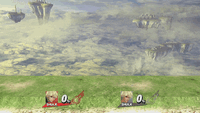
|
|---|
Taunts
- Up taunt: Shrugs, shakes his head, and waves a hand as if lecturing someone while saying "Now it's Shulk time!" (穏やかじゃないですね?, Not being gentle, huh?). The animation itself resembles the one Shulk performs when engaging in a conversation in Xenoblade Chronicles. The English phrase is a reference to Reyn, his best friend and one his party members, who utters the phrase "Now it's Reyn time!" whenever his Talent Art gauge is completely filled during combat. The Japanese phrase similarly references a popular phrase in Japan; in this case, a line Shulk commonly says when accepting quests.
- Side taunt: Grips the Monado's handle with his right hand while triumphantly pumping his left fist and announcing "I'm really feeling it!" (だんだん乗ってきたよ!, Gradually getting the hang of it!). References one of Shulk's voice clips in Xenoblade Chronicles when his tension level increases in combat.
- Down taunt: Grips the Monado with both hands, activates it and poses similarly to when he activates Buster while saying "This is the Monado's power!" (モナドの力よ!, The Monado's power! / The power of the Monado!). If timed correctly, it can dodge certain projectiles, such as Blaster, Hero's Bow, and Palutena Bow. References one of Shulk's lines when he activates the Monado's Talent Art in Xenoblade Chronicles.
| Up taunt | Side taunt | Down taunt |
|---|---|---|
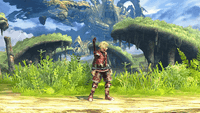
|
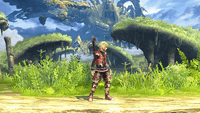
|
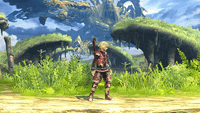
|
Idle poses
- Taps his foot while thinking about something. Based on his idle animation from Xenoblade Chronicles.
- Tenses and quickly looks behind himself, then in front of him before easing up.
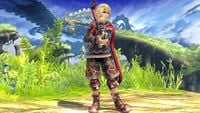 |
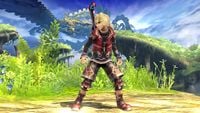
|
|---|
Crowd cheer
| English | Japanese | |
|---|---|---|
| Cheer | ||
| Description | Shulk! Shulk! Shulk! | Shuruku! |
| Pitch | Group chant | Female |
Victory poses
- Swings the Monado a few times while it is active, then holds it level to his head as he deactivates its beam blade, saying either "The future is ours to decide." or "I've got a good rhythm going!" In Japanese respectively, they are みんなの気持ちが伝わってきたよ! (Everyone's feelings have been coming through!) or ほんと、いい流れがつくれているよ! (For real, this makes it a good flow!)
- Swings the Monado upward, places it on his back, and poses with his left hand on his hip, saying either "I got through that pretty good!" or "This is a good result!" In Japanese respectively, they are よかった、これで解決ですね. (All good, it's been quite resolved.) or 結構よい仕上がりだね? (It was a splendid completion, huh?)
- The former English quote Shulk has a chance of exclaiming after finishing a battle in Xenoblade Chronicles, although it has also been changed from plural in that game to singular in SSB4, even in Team Battles, where it is his only line.
- Bows down with the Monado held lengthwise, activates its beam blade and then either
 quickly flexes his fingers before re-grabbing the Monado's handle or
quickly flexes his fingers before re-grabbing the Monado's handle or  continues to hold its handle before posing with the Monado backhandedly, saying either "I can change the future!" or "I can feel the power!" In Japanese respectively, they are 未来は.....変えられるんだ! (The future.....I can change it!) or うん、力を感じる. (Hmm, I feel the power.)
continues to hold its handle before posing with the Monado backhandedly, saying either "I can change the future!" or "I can feel the power!" In Japanese respectively, they are 未来は.....変えられるんだ! (The future.....I can change it!) or うん、力を感じる. (Hmm, I feel the power.)
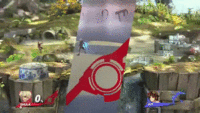 |
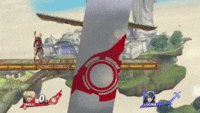 |
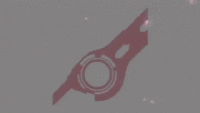
|
|---|
In competitive play
Official Custom Moveset Project
| Character | Custom sets available | ||||
|---|---|---|---|---|---|
| 1113 | 2113 | 3113 | 1123 | 3123 | |
| 3213 | 1122 | 3122 | 1213 | 2123 | |
Notable players
Active
Darkwolf - The best Shulk player in Canada. Placed 13th at Get On My Level 2016 and has achieved numerous top placings at regionals, including 5th at Smash INTENSIFIES 2 and 9th at Nexus 2. Ranked 6th on the Montreal Power Rankings.
Erico - Placed 17th at Kings Of The North 4. Notable for researching and expanding on Shulk's techniques by publishing video tutorials. Introduced Vision Sliding and the Monado Art Buffered Deactivation technique, which led to the discovery of the Monado Purge combo and MonaDACUS. Co-owns the official Shulk Discord with Paradigm.
FuerzaDON - Considered the best Shulk player in Mexico, and one of the first to consistently perform the Monado Art Landing Lag Cancel (MALLC). Placed 13th at True Combo 2015, where he took seven stocks in a crew match, and placed 7th at ConComics Guadalajara 2016. Also won four "Colony 9 Cup" tournaments, which were hosted by the official Shulk Discord and he took sixteen stocks in the Discord JMU Crew Battle: Shulk vs. Cloud.
Jerm - Ranked 3rd on the Ottawa Power Rankings. Host of the Distant Kingdom, which focuses on Shulk techniques and matchups. Made the first official video guide for MALLC.
Kome - Considered the best Shulk in Japan and possibly the world, with wins over players such as komorikiri, Shuton, and You3.
M - 3rd at B.E.A.S.T 7, where he notably beat iStudying.
Masha - Considered the one of the best Shulk players in Japan. Placed 17th at Umebura 25, 13th at Karisuma 10 and 9th at Sumabato 14.
Nicko - Considered one of the best Shulk players in the world. Ranked 11th on the SoCal Power Rankings. Placed 17th at 2GGT: Mexico Saga, 65th at EVO 2016, and 25th at 2GGT: Abadango Saga.
Paradigm - Introduced and researched notable Shulk techniques, such as Vision Sliding and the Monado Purge combo, alongside Erico. Co-owns the official Shulk Discord with Erico.
Soronie - Ranked 6th on the NorCal Power Rankings. Placed 7th at Don't You Dair 3 and 49th at 2GGT: Abadango Saga.
Tremendo Dude - Considered the best Shulk player in Florida. Placed 3rd at Glitch (low-tier) and 9th at Glitch 2 (low-tier).
Inactive
9B - Ranked 8th on the JAPAN Power Rankings. The first player to show mastery of MALLC in a tournament setting.
Artryuu - Ranked 1st and 10th on the Ottawa Smash 4 Power Rankings in May 2015 and 2016, respectively. Placed 33rd at Get On My Level 2016, 25th at Nexus 2 and 4th at Back 2 School: Battle Royale.
Trela
Tier placement and history
Opinions on Shulk's overall viability in the metagame have greatly fluctuated throughout SSB4's lifespan. During the initial release of SSB4, Shulk was quickly discovered to be very flawed due to his moveset being burdened with very sluggish frame data (with aerials incapable of autocanceling throughout their animations), a below average overall damage output, and the fact that some of his moves, such as forward smash, failed to work properly, among other issues. As a result, Shulk was quickly considered to be one of the worst characters in the game. However, update 1.0.4 significantly buffed Shulk, which mainly addressed many of his aforementioned issues. When these buffs were coupled with the discovery of Monado Art Landing Lag Canceling (MALLC), his own signature advanced technique, Shulk's position on the tier list became a hot topic of debate among players due to his perceived potential. Despite retaining his poor frame data, many considered him as a possible high-tier character on the grounds that, if someone could master him, he would be a serious competitive threat.
As time went on, however, players' opinions of Shulk drastically dropped. Despite the benefits of his Monado Arts, Shulk failed to achieve high placings at major tournaments. In addition to this, the metagame's development revealed that Shulk's weaknesses, mostly his poor frame data, were much more detrimental than originally thought. As a result, Shulk was perceived to be a low-tier character and was left with a small, albeit dedicated, playerbase. Despite receiving some buffs in future updates, most notably update 1.1.3, they have not addressed his poor frame data and failed to compensate for it. As such, Shulk was ranked 40th on the first tier list, placing him in the G tier and confirming his status as a low-tier character.
Shulk's representation and results have been largely stagnant for a time, largely due to his sluggish attacks being viewed as a significant issue and too inconsistent for high-level play. This resulted in Shulk being ranked 44th on the second tier list, which saw him remain in the G tier and was a slight drop from his previous ranking. However, this may be attributable to the addition of Corrin and Bayonetta. Despite his low-tier status, Shulk has garnered better results in recent times, with dedicated mains achieving top 13 placing at a more consistent rate within their respective regions. Additionally, Nicko and Darkwolf have achieved notable placings at the national level, such as 17th at 2GGT: Mexico Saga and 13th at Get On My Level 2016, respectively. This rise in results is reflected in Shulk's third and current tier placement at 38th. As such, some believe Shulk is underrated in the current metagame, partly due to his obscurity and very steep learning curve; ZeRo, in particular, considers Shulk to be the lowest ranking high tier character on his personal tier list.
Trophies
- Shulk
In Xenoblade Chronicles, this young lad's colony is attacked by the Mechon, so he and his friends set off to take them down. In Smash Bros., his Monado Arts let him change his specialization during battle. You can choose to boost a stat—his jump or attack, for example—but other stats might drop as a result, so choose wisely.
In Xenoblade Chronicles, this young lad's colony is attacked by the Mechon, so he and his friends set off to take them down. In this game, his Monado Arts let him change his specialisation during battle. You can choose to boost a stat—his jump or attack, for example—but other stats might drop as a result, so choose wisely.
- Shulk (Alt.)
Shulk's up special Air Slash is an upward slash done during a jump. Press the button again quickly to launch opponents sideways. His side special Back Slash, on the other hand, is a downward swing with a very wide range, though using it leaves Shulk wide open. Try hitting foes from behind with this!
Shulk's up special, Air Slash, is an upward slash done during a jump. Press the button again quickly to launch opponents sideways. His side special, Back Slash, on the other hand, is a downward swing with a very wide range, although using it leaves Shulk wide open. Try hitting foes from behind with this to do more damage!
- Chain Attack
- In Xenoblade Chronicles, building up the party's team spirit would let them unleash a chain attack, using multiple Arts in a row to deal massive damage. In this game, Shulk's Final Smash calls party members Dunban and Riki to help obliterate an unlucky target... or multiple targets if you catch more than one in the circle of light!
- ShulkAllStarTrophy3DS.png
Alt. (3DS)
In Event Matches
Solo Events
- Mechanical Menace: Shulk must defeat a metal R.O.B., a metal Mega Man and Metal Face in a Stamina Battle.
- New Challengers 2: Shulk is one of the opponents fought in this event, alongside Greninja, Palutena, Robin, Dark Pit, Mega Man and Pac-Man.
- The Ultimate Swordsman: As Ike, the player must defeat Shulk, Link, Marth, Meta Knight, Toon Link, male Robin and female Robin. All of the opponents wield swords.
Co-op Events
- The Ultimate Battle: Two players select a character and must defeat the entire roster.
Alternate costumes
With the exception of his first and last alternate costumes, all of Shulk's palette swaps correspond with one of his traveling companions in Xenoblade Chronicles.

| |||||||

|

|

|

|

|

|

|

|
Gallery
Shulk's amiibo.
- Shulk Alt.png
Shulk's armorless alternate costume.
Using his forward smash on Sheik.
Using his up smash on Captain Falcon while activating Smash.
Using Back Slash on Donkey Kong and Link.
Using his down taunt alongside two Villagers using their down taunts.
Using Chain Attack, his Final Smash, which features Dunban and Riki.
With Luigi on Boxing Ring.
Shulk and Riki in Super Smash Bros. for Nintendo 3DS.
On Smash Ball standby on Final Destination.
Reveal trailer
<youtube>GUl1EkUJ46k</youtube>
Trivia
- Shulk makes a few references to his home game:
- He retains his jumping animation from Xenoblade Chronicles, while his dashing animation and one of his idle poses are almost identical to how they appeared in said game as well.
- When it is not in use, the Monado simply hangs from his back. This carryover makes Shulk the only sword-wielding character in the Super Smash Bros. series that does not hold their sword when not attacking with it. Ganondorf and his Sword of Sages are exempt, due to the Sword of Sages' usage as a weapon only occurring as a custom move.
- Many of his voice clips are re-recorded versions of the lines that he would speak throughout Xenoblade Chronicles.
- Shulk is the only character to tumble towards the screen when another character footstool jumps on him, whereas other characters would spin towards the direction they were facing. He is also the only character to hit the screen with his back during a screen KO. These animations make the Monado and its active Art more visible to the player.
- Shulk is the only human sword-wielding character that uses a "wobbling" sound effect while charging up smash attacks instead of the "unsheathing" sound that the rest of the sword-wielding characters use.
- Shulk and Palutena are the only characters who can interrupt one of their aerials during their ending frames. In Shulk's case, he can interrupt all of aerials during their ending frames, which allows him to act out of them before he lands. One example is replacing a back aerial's 19 frames of landing lag by performing a neutral aerial before landing, cutting its landing lag to 10 frames.
- The voice clip for his third victory pose, "I can change the future!", is missing from the Sound Test.
- On Super Smash Bros. for Nintendo 3DS, Shulk's swimsuit palette swap will cause part of his neck to stretch and connect with the Monado during Shulk's on-screen appearance and down taunt. This is an oversight due to it sharing the same bone as the Monado's ring.
- If playing on any 2D stages on Super Smash Bros. for Nintendo 3DS, such as Flat Zone 2 or Super Mario Maker, the Monado's beam blade will not align properly in several situations: during his sword-swinging victory pose, Chain Attack's final slash, and his backhanded victory pose (the latter causing the beam blade to appear much thinner than usual).
- Despite not being a third-party character, Shulk is placed alongside them in most official material, including the Super Smash Bros. for Nintendo 3DS roster and foldout. In the Super Smash Bros. for Wii U roster, Shulk is placed before the clones, and in the Super Smash Bros. for Wii U manual, he is placed before Bowser Jr. As a result of this placement, Shulk may be mistaken as a third-party character. However, since Nintendo acquired Monolith Soft in 2007 prior to the development of Xenoblade Chronicles, Shulk is not a third-party character.
| Fighters in Super Smash Bros. 4 | |
|---|---|
| Veterans | Bowser · Captain Falcon · Charizard · Diddy Kong · Donkey Kong · Dr. Mario · Falco · Fox · Ganondorf · Ike · Jigglypuff · King Dedede · Kirby · Link · Lucario · Lucas · Luigi · Mario · Marth · Meta Knight · Mewtwo · Mr. Game & Watch · Ness · Olimar · Peach · Pikachu · Pit · R.O.B. · Roy · Samus · Sheik · Sonic · Toon Link · Wario · Yoshi · Zelda · Zero Suit Samus |
| Newcomers | Bayonetta · Bowser Jr. · Cloud · Corrin · Dark Pit · Duck Hunt · Greninja · Little Mac · Lucina · Mega Man · Mii Fighter (Mii Brawler · Mii Gunner · Mii Swordfighter) · Pac-Man · Palutena · Robin · Rosalina & Luma · Ryu · Shulk · Villager · Wii Fit Trainer |
|
| |
|---|---|
| Fighters | Shulk (SSB4 · SSBU) · Pyra (SSBU) · Mythra (SSBU) |
| Assist Trophy | Riki |
| Stages | Gaur Plain · Cloud Sea of Alrest |
| Other characters | Azurda · Dunban · Fiora · Metal Face · Nia · Rex |
| Trophies and Spirits | Trophies · Spirits |
| Music | SSB4 · Ultimate |
